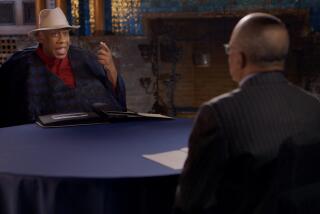TV Reviews : Monitor, Merrimack and Romance on TNT
The Navy didn’t have many headlines to grab in the Persian Gulf. Military history will likely record that the Navy’s finest hour was World War II. And its first? Well, forget John Paul Jones and wooden frigates. The modern Navy began with the great four-hour clash between the Monitor and the Merrimack, when ships forged of iron fought to a standoff near Hampton Roads, Va.
Just when the Navy could use the attention, along comes the Civil War broadside “Ironclads” (at 5 p.m. on cable’s TNT, with repeats at 7, 9 and 11 p.m.).
This is vibrant family viewing, unthreatening but bloody all the same, with terrific models, special effects and miniatures that create a flavorful shipboard texture.
The tone is romantic but not saccharine. As one of the cast members is reported to have said, the production is “ ‘Gone With the Wind’ meets ‘The Hunt for Red October.’ ” It’s hard to top that.
The production doesn’t claim that the principals in Garold Gast’s teleplay are real characters. But they’re flamboyant. There’s a beautiful Southern belle of a spy played with a sense of urgency by Virginia Madsen. Alex Hyde-White is her lover and captain of the Rebels’ Merrimack, which resembles a floating barn roof. E.G. Marshall is a Yankee commodore who cynically calls the Monitor “a matchbox on top of a raft.”
The cast includes a young Leslie Howard look-alike (Reed Edward Diamond) who drops behind antebellum lines to sneak designs of the heavily plated, revolutionary Merrimack to the Monitor’s egocentric, Yankee maritime architect (the flustered Fritz Weaver).
Which sadly brings us to Abraham Lincoln (James Getty), the worst Lincoln portrayal you are likely to see. What a hayseed. How could producers Norman and David Rosemont do it? Where was director Delbert Mann when they cast this role?
At least it’s a cameo. Lincoln doesn’t sink the picture. And if you recall from grade school, the ironclads on that memorable day (March 8, 1862) don’t sink either.
A Study in Guilt Over Retarded Child on ABC
Olympia Dukakis and Amy Madigan, as an embattled mother and daughter, propel the drama “Lucky Day” (at 9 tonight on Channels 7, 3, 10 and 42). Performances, script and a rigorous, unsentimental tone merge to create a nominally riveting catharsis.
On the surface, the drama centers on a mentally retarded sister (Chloe Webb). In truth, the original teleplay by John Axness and Jennifer Miller is really a study in the guilt of those responsible for raising an adult woman who has the mind of a 6-year-old.
Madigan and Dukakis vivify the plot with textured performances. Dukakis’ character, now sober after a lifelong involvement with booze, wages a legal battle to win back her younger retarded daughter, who’s been raised and loved by Madigan, the nurturing sister.
The mother’s selfishness and pretenses are hideous at times, full of concealed embarrassment and even fear of a daughter who’s impaired, as Madigan angrily charges, because Mom “was a fallen down drunk” during pregnancy. The bloodiest battle scar in the drama occurs when the Madigan daughter nails the mother with three words: “fetal alcoholic dependency.”
The courtroom scene where ultimate conservatorship is determined is a scorcher. Madigan, who plays an abstract painter and has a romance with her art instructor (a sturdy performance by Terence Knox), is no Joan of Arc either. A classic childhood “I wish my sister were dead” memory haunts her life, and her noble sacrifice in raising her sister is seriously tempered by her own dependency on her sick sibling.
Despite several past depictions of retardation in movies and TV, mental impairment is still rather uncharted territory for actors. Donald Wrye’s direction and Webb’s performance--sweet, endearing, confused, hyper--create a lingering image of quirks and open-armed, indiscriminate love.
More to Read
The complete guide to home viewing
Get Screen Gab for everything about the TV shows and streaming movies everyone’s talking about.
You may occasionally receive promotional content from the Los Angeles Times.






